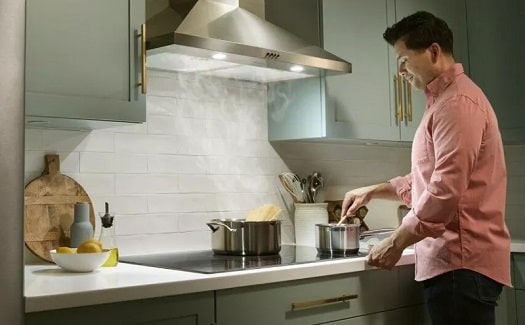When it comes to selecting the right range hood for your kitchen, one of the primary decisions you'll need to make is whether to go for a ducted vs. ductless range hood. Both options have their own set of advantages and disadvantages, and choosing the one that suits your needs depends on various factors. In this article, we'll delve into the pros and cons of both types to help you make an informed decision. Turn to the experts at PlumbersStock for all your HVAC questions, particularly about duct and vent FAQs. You can also shop duct and vent.
Ducted Range Hood:

Pros:
- Effective Smoke and Odor Removal: Ducted range hoods are highly efficient at removing smoke, steam, and cooking odors from your kitchen. They vent these pollutants outside, ensuring indoor air quality remains high.
- Powerful Performance: Ducted range hoods are generally more powerful and can handle more air. This makes them ideal for kitchens where cooking is frequent and involves high-heat methods like frying and grilling.
- Quiet Operation: Due to their powerful performance, ducted range hoods can operate more quietly because they don't need to work as hard to maintain airflow.
- Reduced Maintenance: Ducted range hoods typically require less maintenance since they don't use filters that need regular cleaning or replacement. This can save you time and money in the long run.
Cons:
- Installation Complexity: Installing a ducted range hood can be more complex and expensive due to the need for proper ductwork. This may involve drilling holes in your walls or ceiling and routing the ducts to the exterior of your home.
- Limited Placement Options: Ducted range hoods must be installed near an exterior wall for duct routing. This can limit your flexibility in choosing the placement of your range hood within the kitchen.
- Higher Initial Cost: Ducted range hoods generally have a higher upfront cost due to their more sophisticated design and installation requirements.
Ductless Range Hood:
Pros:
- Easy Installation: Ductless range hoods are easier to install since they don't require ductwork. This can be a more practical option for kitchens where duct installation is challenging or not feasible.
- Flexible Placement: You can choose where to place your range hood within the kitchen without requiring ducts.
- Lower Initial Cost: Ductless range hoods are often more budget-friendly initially, making them an attractive option for those looking to save money upfront.
Cons:
- Less Effective Smoke and Odor Removal: Ductless range hoods use filters to trap and recirculate air but are less effective at removing pollutants than ducted range hoods. While they help reduce odors, some smoke and steam might still linger in the kitchen.
- Regular Maintenance: Ductless range hoods require regular filter cleaning or replacement to maintain effectiveness. This ongoing maintenance can add to the cost and effort over time.
- Noise Levels: Since ductless range hoods need to work harder to recirculate air, they can be noisier than their ducted counterparts.
- Limited Heat Removal: Ductless range hoods are less effective at removing excess heat from the kitchen than ducted hoods, which can lead to discomfort while cooking.
Save at PlumbersStock
In conclusion, choosing between a ducted and ductless range hood depends on your kitchen setup, cooking habits, and priorities. If you prioritize maximum performance and effective smoke and odor removal and are willing to invest in installation, a ducted range hood might be the better choice. On the other hand, if you're looking for an easier and more budget-friendly installation with flexibility in placement, a ductless range hood could be a suitable option. Consider your cooking needs, budget, and kitchen layout to make the best decision for your home.



